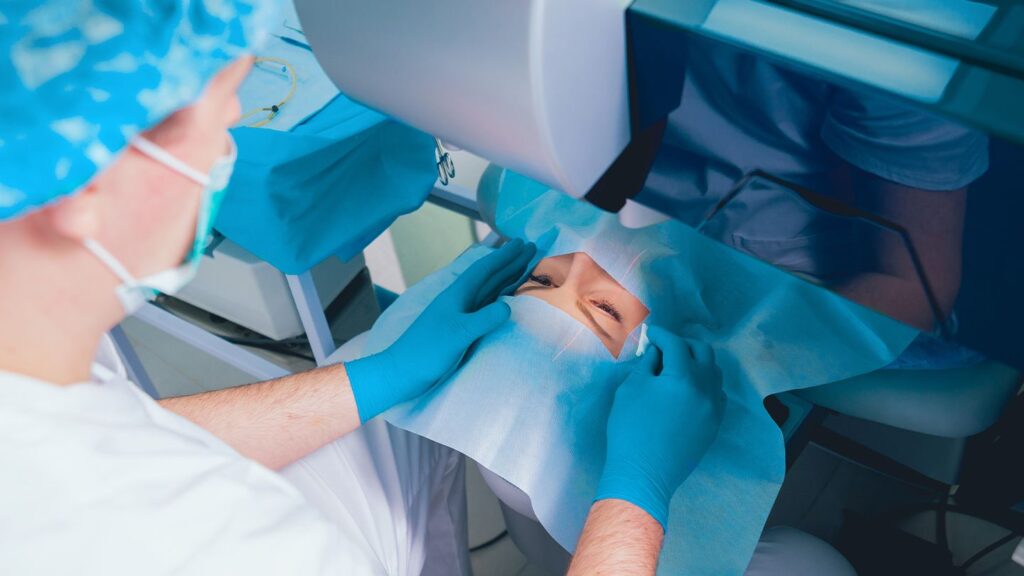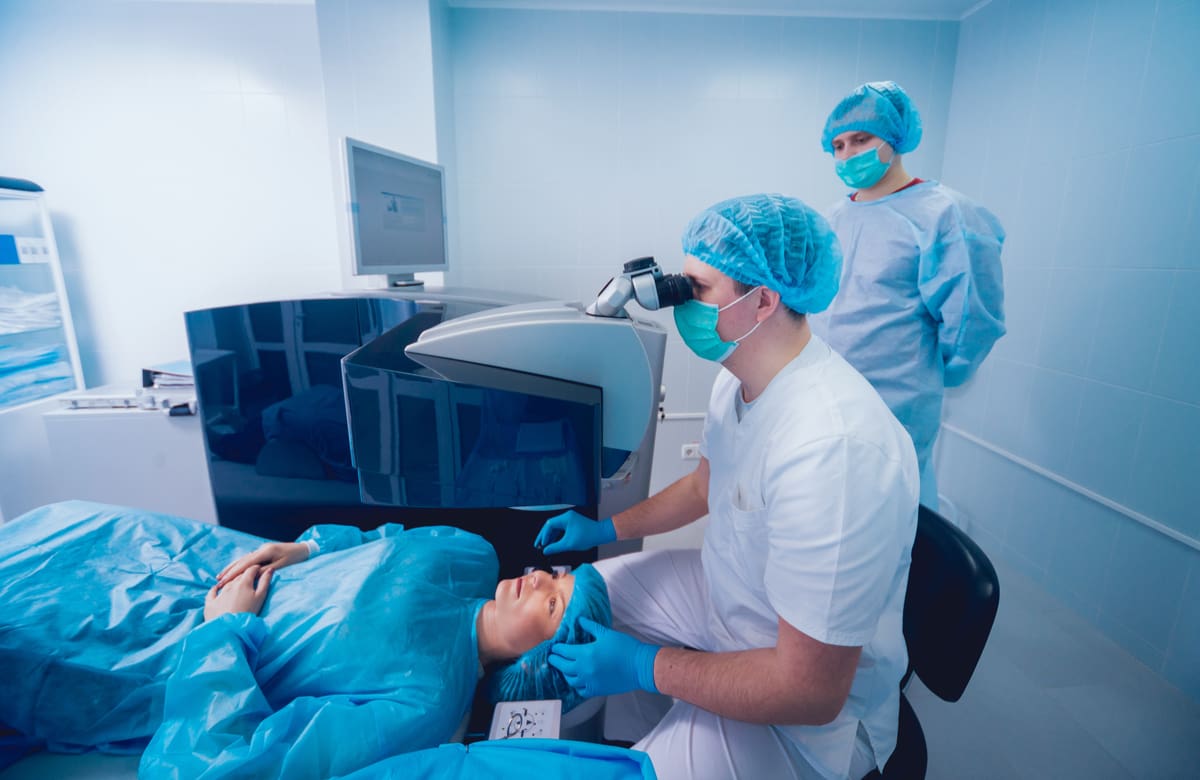Laser eye surgery has become an increasingly popular procedure for individuals seeking to improve their vision and reduce their reliance on glasses or contact lenses. While the benefits of this surgery are well-known, it is crucial to understand the potential risks and complications involved before making a decision. This article aims to provide an in-depth overview of the risks associated with laser eye surgery and how you can mitigate them.
Understanding Laser Eye Surgery
Laser eye surgery, also known as refractive surgery, is a transformative procedure that utilizes advanced laser technology to reshape the cornea of the eye. This innovative surgery is designed to address common refractive errors such as myopia (nearsightedness), hyperopia (farsightedness), and astigmatism, ultimately improving the patient’s vision and reducing their dependence on glasses or contact lenses.
During laser eye surgery, precision is key. The surgeon carefully uses a femtosecond laser or an excimer laser to create a thin flap on the surface of the cornea. This flap allows access to the underlying corneal tissue, which is then reshaped with meticulous accuracy by removing a minuscule amount of tissue using the laser. The reshaping process is crucial in correcting the refractive error and enhancing the eye’s focusing power.
The Basics of Laser Eye Surgery
The intricate process of laser eye surgery involves not only reshaping the cornea but also ensuring the proper alignment and healing of the eye post-surgery. Once the corneal reshaping is complete, the delicate flap is meticulously repositioned, acting as a natural bandage that promotes healing and stabilizes the newly corrected cornea. This careful procedure allows for a swift recovery and optimal visual outcomes for the patient.

The Different Types of Laser Eye Surgery
There is a range of laser eye surgeries available to cater to diverse patient needs and preferences. Popular options include LASIK (Laser-Assisted In Situ Keratomileusis), known for its rapid recovery and minimal discomfort, PRK (Photorefractive Keratectomy), which is suitable for individuals with thin corneas, and LASEK (Laser Epithelial Keratomileusis), a procedure that combines elements of LASIK and PRK to offer a tailored approach to vision correction. The selection of the most suitable surgery is a collaborative decision between the patient and the eye care professional, taking into account factors such as the patient’s eye prescription, corneal thickness, and lifestyle requirements.
Potential Risks of Laser Eye Surgery
While laser eye surgery is generally safe and effective, like any surgical procedure, it does carry risks. It is essential to be aware of these risks before undergoing the surgery.
Before deciding to undergo laser eye surgery, it is crucial to have a thorough consultation with your ophthalmologist. During this consultation, your eye health, refractive error, corneal thickness, and overall suitability for the procedure will be assessed. This evaluation helps in determining the potential risks specific to your individual case and allows for a more informed decision-making process.
Short-Term Risks and Side Effects
In the immediate post-operative period, patients may experience dryness, halos around lights, glare, and temporary vision fluctuations. These side effects are usually temporary and tend to improve as the eyes heal. The surgeon may prescribe lubricating eye drops or other medications to alleviate these symptoms. Learn more about lubricating at https://connects.catalyst.harvard.edu/Profiles/profile/1220686
In some cases, patients may develop an infection or inflammation in the cornea, which can cause blurry vision and discomfort. However, with proper pre- and post-operative care, the risk of infection or inflammation can be significantly minimized.
It is important to follow all post-operative instructions provided by your surgeon diligently to reduce the likelihood of experiencing these short-term risks. Attend all follow-up appointments to ensure that your eyes are healing properly and to address any concerns you may have during the recovery process.
Long-Term Risks and Complications
While rare, there are potential long-term risks and complications associated with laser eye surgery. These include undercorrection or overcorrection of refractive errors, regression of the initial correction, and the development of corneal ectasia (a weakening and bulging of the cornea). It is important to discuss these risks with your surgeon before making a decision.
Your surgeon will provide you with detailed information on the likelihood of experiencing these long-term risks based on your individual circumstances. Understanding the potential complications allows you to make an informed choice about whether laser eye surgery is the right option for you.
Factors Influencing the Risks of Laser Eye Surgery
Pre-existing Health Conditions
Certain pre-existing health conditions, such as autoimmune disorders, uncontrolled diabetes, or chronic dry eye, may increase the risk of complications during and after laser eye surgery. It is crucial to inform your surgeon about any underlying health conditions you may have to determine whether you are a suitable candidate for the procedure. To read more about autoimmune disorders click here.
Autoimmune disorders, like rheumatoid arthritis or lupus, can affect the body’s ability to heal properly after surgery, leading to prolonged recovery times and increased risks of infection. Uncontrolled diabetes can impact the stability of your vision prescription, making it challenging to achieve the desired outcome from the surgery. Chronic dry eye, a condition characterized by insufficient tear production, can result in discomfort and delayed healing post-surgery.
The Skill and Experience of the Surgeon
The skill and experience of your surgeon play a significant role in minimizing the risks associated with laser eye surgery. Choose a surgeon who is board-certified and has a proven track record of successful surgeries. Before undergoing the procedure, ask your surgeon about their experience and how many surgeries they have performed.
A highly skilled and experienced surgeon will not only have a lower rate of complications but will also be better equipped to handle any unexpected issues that may arise during the surgery. They will have a keen eye for detail and precision, crucial for achieving optimal results. Additionally, an experienced surgeon will take the time to thoroughly assess your individual case, customize a treatment plan that suits your specific needs, and provide comprehensive pre and post-operative care to ensure a smooth recovery process.
How to Mitigate the Risks of Laser Eye Surgery
Considering laser eye surgery to correct your vision? It’s essential to understand the steps you can take to mitigate the risks associated with this procedure. Proper pre-surgery care and diligent post-surgery follow-up are key components in ensuring a successful outcome.
Proper Pre-Surgery Care
Prior to the surgery, your surgeon will conduct a comprehensive eye examination to assess your eligibility for laser eye surgery. This examination will evaluate factors such as the thickness of your cornea, the shape of your eye, and the overall health of your eyes. It is crucial to provide accurate information about your medical history and any pre-existing eye conditions to ensure the best possible outcome.
Follow your surgeon’s instructions regarding medications, eye drops, and contact lens usage before the surgery. These instructions are designed to prepare your eyes for the procedure and minimize the risk of complications. By ensuring that your eyes are in optimal condition, you can increase the likelihood of a successful surgery and a smooth recovery process.
Post-Surgery Care and Follow-Up
After laser eye surgery, the immediate post-operative period is critical for your recovery. It is crucial to follow your surgeon’s post-operative care instructions diligently to promote healing and reduce the risk of complications. This may include using prescribed eye drops to prevent infection and inflammation, avoiding activities that could strain your eyes, and practicing good eye hygiene.
Attending all scheduled follow-up appointments is essential for monitoring your healing progress and addressing any concerns that may arise. Your surgeon will evaluate your vision and overall eye health during these appointments to ensure that you are on track for a successful recovery. By following your surgeon’s recommendations and staying proactive in your post-operative care, you can help mitigate the risks associated with laser eye surgery and achieve the clear vision you desire.

Making an Informed Decision about Laser Eye Surgery
Questions to Ask Your Surgeon
Before committing to laser eye surgery, it is essential to have an open and honest discussion with your surgeon. Ask about the potential risks specific to your case, the probability of achieving your desired outcome, and the surgeon’s experience with similar cases. Additionally, inquire about alternative treatment options and their respective risks and benefits.
One crucial aspect to consider is the technology being used for the procedure. Different laser technologies offer varying levels of precision and customization. Understanding the equipment your surgeon uses can provide insight into the quality of care you will receive and the potential outcomes of the surgery.
Understanding the Pros and Cons
While laser eye surgery offers numerous benefits, it is essential to weigh them against the potential risks. Consider factors such as your lifestyle, career, and visual requirements. Consult with your surgeon, consider obtaining a second opinion, and gather as much information as possible to make an informed decision about whether laser eye surgery is right for you.
Furthermore, it is crucial to discuss the post-operative care plan with your surgeon. Understanding the recovery process, including any restrictions on activities and follow-up appointments, can help you prepare for the period after the surgery and ensure optimal healing and visual outcomes.
In conclusion, laser eye surgery can be a life-changing procedure for individuals seeking visual improvement. However, it is important to thoroughly understand the risks and complications associated with the surgery. By taking necessary precautions, selecting a skilled surgeon, and engaging in thorough discussions, you can make an educated decision and mitigate potential risks. Always prioritize your eye health and well-being above all else.
Read more about Glaucoma Surgery 0n https://grundyrds.org/innovations-in-glaucoma-surgery-to-improve-patient-outcomes/

